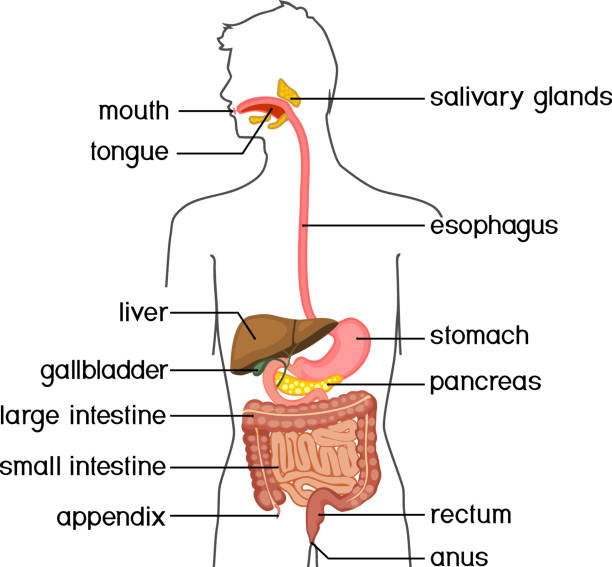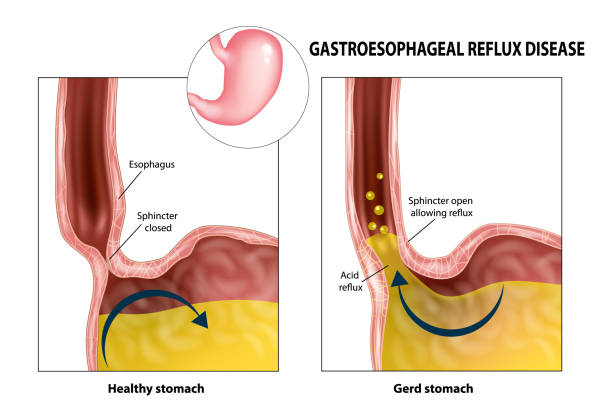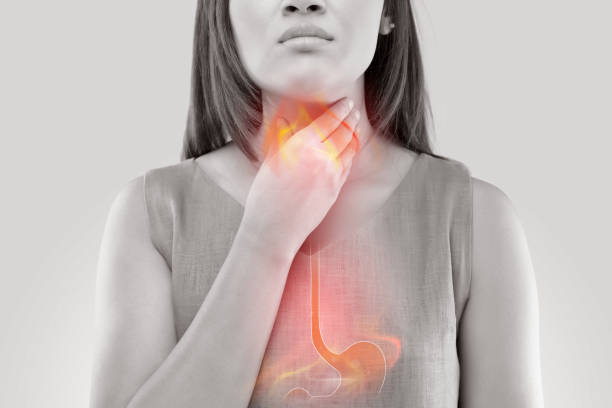Learn the causes, risk factors, symptoms and treatments of heartburn. Find out how to reduce your risk of developing this uncomfortable condition and take control of your health today!
Disclaimer
The information provided in this blog post is intended for educational purposes only. It should not be used as a substitute for professional medical advice, diagnosis, or treatment. Please consult your healthcare provider if you have any questions related to your health, and before making any changes to your diet, exercise routine, or medical treatments. This blog post has no affiliate links, and is not sponsored by any company or organization.
Do you often experience a burning sensation in your chest or throat after eating? Or do you wake up at night with bitter, sour-tasting stomach content in your mouth disrupting your sleep?
If yes, you may be suffering from acid reflux, also known as heartburn, acid indigestion, or gastroesophageal reflux disease (GERD).

Heartburn or Acid reflux affects millions of people worldwide. It is an uncomfortable condition, and many factors can increase the risk of developing it.
By understanding the various factors leading to the risk of developing it, or worsening the symptoms of acid reflux, you can take steps to improve your overall health and well-being.
1. What Is Heartburn
Heartburn, acid reflux or GERD is a digestive disorder that happens when acidic stomach contents travel back into your food pipe, the oesophagus, causing a painful burning sensation in your chest or throat. The oesophagus is a 25cm long, hollow muscular tube that carries food and liquid from your throat to your stomach.

While some individuals occasionally experience acid reflux after eating trigger foods, others may suffer from chronic acid reflux. Chronic acid reflux is called gastroesophageal reflux disease, or GERD for short. GERD is a condition in which acid-containing contents in your stomach persistently flow back up into your oesophagus.
Despite its name, heartburn involves your digestive system, not the heart.
2. Causes
The most common cause of heartburn is a weakened or damaged lower oesophageal sphincter (LES). It’s like a ring-shaped muscle that lies at the base of the esophagus and acts like a valve. This valve opens to allow food to enter your stomach for digestion. It stays closed to prevent food and stomach acid from flowing back into your oesophagus.

When this valve does not function properly, acidic stomach contents can travel back into the oesophagus, causing heartburn and other symptoms.
3. Risk factors leading to heartburn

Several factors can weaken or damage the LES:
- Eating certain foods, such as fatty and fried foods, spicy foods, processed meats, citrus fruits, and chocolate can relax the LES and make reflux more likely
- Eating large meals, or lying down right after eating can put pressure on the LES, allowing acid to flow back into the food pipe
- Drinking too much alcohol or caffeine can increase acid production in the stomach, making it easier for acid to move up into the food pipe
- Being overweight or obese makes it more likely that pressure will be put on the LES, thus leading to reflux
- Smoking irritates the oesophagus and increases stomach acid production. It also slows digestion, causing stomach contents to remain in the stomach longer and flow back up into the food pipe
- Pregnancy causes hormonal changes that increase the risk of heartburn, particularly during late pregnancy when your growing baby puts pressure on your stomach
- Certain medications, such as, sedatives and antidepressants, high blood pressure medications, nonsteroidal anti-inflammatory drugs (NSAIDs) weaken the LES and lead to acid reflux
- Hiatal hernia, a condition in which the opening in your diaphragm lets the upper part of the stomach move up into your chest
4. Symptoms

The most common symptom of heartburn is a burning sensation in the chest, or the middle of your abdomen, a feeling of food caught in your throat. Other symptoms include:
- A bitter or sour taste in your mouth
- Chest pain
- Regurgitation (stomach acid or food comes back up through your food pipe, into your throat or mouth)
- Loss of appetite
- Difficulty or pain with swallowing
- Persistent nausea
- Vomiting
- Chronic cough
- Hoarseness of voice
- Shortness of breath
If you experience these symptoms more than twice a week, it is important to see your doctor, as this condition can cause serious health complications if left untreated.
5. Treatment and Management
Several treatment options are available to help prevent or alleviate the symptoms of this condition.

- Lifestyle Changes: Eating smaller meals more frequently throughout the day can reduce symptoms of heartburn. Additionally, avoiding trigger foods (such as spicy, acidic or fatty foods), waiting 2-3 hours after you eat before lying down, quitting smoking, losing excess weight if needed and avoiding alcohol can also be very beneficial for controlling acid reflux
- Medication: If lifestyle changes don’t provide sufficient relief, your physician may prescribe medications to help with symptoms of acid reflux. Antacids, H2 blockers, and proton pump inhibitors (PPIs) are common medications used to treat the symptoms of heartburn or GERD, and related conditions. Antacids can relieve mild heartburn and other mild symptoms. Still, they should not be used daily or for severe symptoms without consulting a physician. H2 blockers lower acid production in the stomach and can help heal the oesophagus. PPIs are even more effective at treating GERD symptoms and healing the oesophageal lining. All medications should be discussed with a doctor before use
- Surgery : Surgery is an option for people with GERD who don’t improve with lifestyle changes and medication or who wish to stop taking long-term medications. The most common surgery for GERD is fundoplication, which involves a surgeon sewing the top of the stomach around the end of the oesophagus to add pressure to the lower oesophagal sphincter to prevent reflux. Bariatric surgery may also be recommended for people with GERD and obesity, which helps you to lose weight and reduce symptoms of acid reflux. Endoscopy is rarely used. It involves a small flexible tube inserted into the oesophagus to sew the stomach around the sphincter or deliver radiofrequency energy to the sphincter
With so many treatment options available, working with your healthcare provider to find the right solution for your individual needs is essential.
6. Takeaways
Heartburn, acid reflux, or GERD is a common digestive disorder that can cause painful and uncomfortable symptoms like chest pain, regurgitation, difficulty swallowing, and constant nausea. Fortunately, several lifestyle changes and medications are available to help reduce or prevent the symptoms of this painful condition. It is important to work closely with your healthcare provider to find the best treatment options for your individual needs. You can find relief from your acid reflux symptoms with the right combination of lifestyle changes, medication or even surgery.
I hope this information helped you understand all the details about your acid reflux, its symptoms, and equipped with the information, you will be able to better manage the symptoms, and improve your quality of life.
7. Further reading
If you would like to know more information about heartburn, acid reflux or GERD, and how to manage it, check out my blog post here. If you want to nerd out about this condition, you can check out the few articles I have listed below:
• National Library of Medicine. Heartburn. Accessed May 8, 2023.
https://medlineplus.gov/heartburn.html
National Institute of Diabetes and Digestive and Kidney Diseases. Accessed May 8, 2023.
https://www.niddk.nih.gov/health-information/
digestive-diseases/acid-reflux-ger-gerd-adults
• Healthline. Acid Reflux and Shortness of Breath. Robin Madell, updated on April 17, 2023. Accessed May 8, 2023. https://www.healthline.com/health/gerd/
shortness-of-breath#_noHeaderPrefixedContent
• Acid Reflux (GER and GERD) in Adults. National Institute of Diabetes and Digestive and Kidney Diseases. Accessed May 9, 2023. https://www.niddk.nih.gov/health-information/
digestive-diseases/acid-reflux-ger-gerd-adults/treatment
Share your experience
Share your own story with Heartburn or acid reflux with us. You may write as you wish, or consider the following questions as a guide to help you include the key points of your personal experience.
- Have you ever experienced acid reflux?
- What lifestyle changes have you made to better manage your acid reflux symptoms?
- How have medications helped to reduce the frequency and severity of your acid reflux?
- What other strategies have you found to help with symptoms of acid reflux?
- Are there any natural remedies that have worked for you in dealing with acid reflux?





